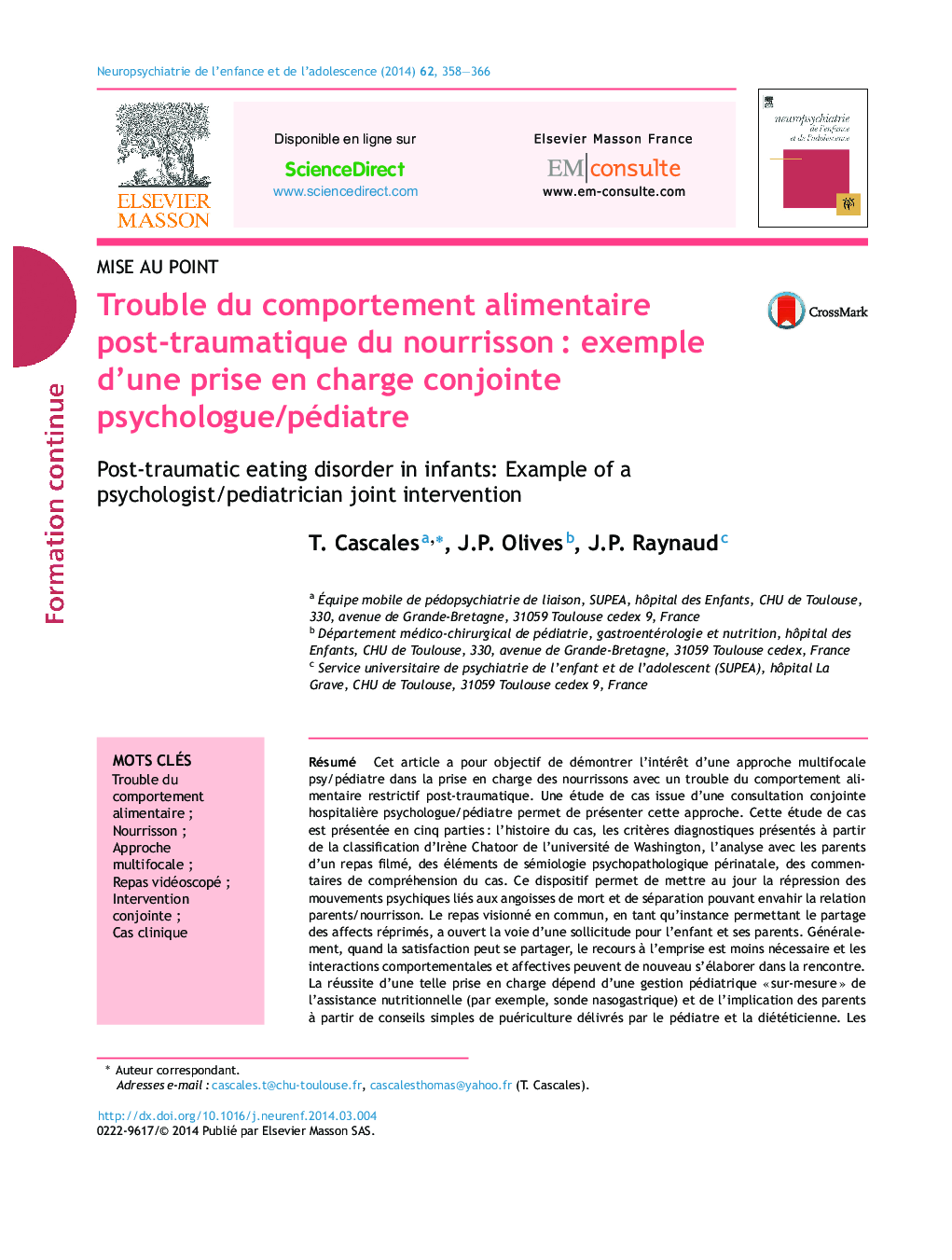| کد مقاله | کد نشریه | سال انتشار | مقاله انگلیسی | نسخه تمام متن |
|---|---|---|---|---|
| 943888 | 925569 | 2014 | 9 صفحه PDF | دانلود رایگان |

RésuméCet article a pour objectif de démontrer l’intérêt d’une approche multifocale psy/pédiatre dans la prise en charge des nourrissons avec un trouble du comportement alimentaire restrictif post-traumatique. Une étude de cas issue d’une consultation conjointe hospitalière psychologue/pédiatre permet de présenter cette approche. Cette étude de cas est présentée en cinq parties : l’histoire du cas, les critères diagnostiques présentés à partir de la classification d’Irène Chatoor de l’université de Washington, l’analyse avec les parents d’un repas filmé, des éléments de sémiologie psychopathologique périnatale, des commentaires de compréhension du cas. Ce dispositif permet de mettre au jour la répression des mouvements psychiques liés aux angoisses de mort et de séparation pouvant envahir la relation parents/nourrisson. Le repas visionné en commun, en tant qu’instance permettant le partage des affects réprimés, a ouvert la voie d’une sollicitude pour l’enfant et ses parents. Généralement, quand la satisfaction peut se partager, le recours à l’emprise est moins nécessaire et les interactions comportementales et affectives peuvent de nouveau s’élaborer dans la rencontre. La réussite d’une telle prise en charge dépend d’une gestion pédiatrique « sur-mesure » de l’assistance nutritionnelle (par exemple, sonde nasogastrique) et de l’implication des parents à partir de conseils simples de puériculture délivrés par le pédiatre et la diététicienne. Les professionnels de la pédiatrie doivent associer leurs compétences à l’élaboration du matériel psychique recueilli par le psy concerné.
SummaryThis article aims to show the interest of a multifocal approach pediatric/psy in the management of infants with a post-traumatic restrictive eating disorder. This approach is presented from a joint psychologist/pediatrician consultation in a children's hospital. This case study is presented in five parts: the case history, diagnostic criteria presented according to the classification of Irene Chatoor, University of Washington, the analysis with the parents of a filmed meal, elements of perinatal psychopathological semiology, comments on the understanding of the case. This device allows to uncover the psychological repression of feelings related to anxiety of death and separation that can invade the parent/infant relationship. The meal viewed together, as a forum for the sharing of repressed emotions, opened the way to a concern for the child and his parents. Generally, when satisfaction can be shared, use the grip is less necessary and behavioral and emotional interactions can be developed through the meeting again. The success of such a device depends on a “tailor-made” pediatric management “overmeasure” of the nutritional assistance (for example, nasogastric probe) and the involvement of the parents starting from simple councils on child welfare delivered by the pediatrician and the dietician. Professionals from the field of pediatrics must combine their skills to think and work from the psychological data collected by the relevant therapist.
Journal: Neuropsychiatrie de l'Enfance et de l'Adolescence - Volume 62, Issue 6, October 2014, Pages 358–366